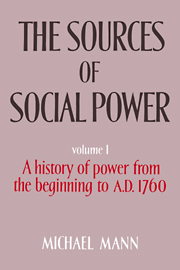Book contents
- Frontmatter
- Contents
- Preface
- 1 Societies as organized power networks
- 2 The end of general social evolution: how prehistoric peoples evaded power
- 3 The emergence of stratification, states, and multi-power-actor civilization in Mesopotamia
- 4 A comparative analysis of the emergence of stratification, states, and multi-power-actor civilizations
- 5 The first empires of domination: the dialectics of compulsory cooperation
- 6 “Indo-Europeans” and iron: expanding, diversified power networks
- 7 Phoenicians and Greeks: decentralized multi-power-actor civilizations
- 8 Revitalized empires of domination: Assyria and Persia
- 9 The Roman territorial empire
- 10 Ideology transcendent: the Christian ecumene
- 11 A comparative excursus into the world religions: Confucianism, Islam, and (especially) Hindu caste
- 12 The European dynamic: I. The intensive phase, A.D. 800–1155
- 13 The European dynamic: II. The rise of coordinating states, 1155–1477
- 14 The European dynamic: III. International capitalism and organic national states, 1477–1760
- 15 European conclusions: explaining European dynamism – capitalism, Christendom, and states
- 16 Patterns of world-historical development in agrarian societies
- Index
2 - The end of general social evolution: how prehistoric peoples evaded power
Published online by Cambridge University Press: 26 December 2009
- Frontmatter
- Contents
- Preface
- 1 Societies as organized power networks
- 2 The end of general social evolution: how prehistoric peoples evaded power
- 3 The emergence of stratification, states, and multi-power-actor civilization in Mesopotamia
- 4 A comparative analysis of the emergence of stratification, states, and multi-power-actor civilizations
- 5 The first empires of domination: the dialectics of compulsory cooperation
- 6 “Indo-Europeans” and iron: expanding, diversified power networks
- 7 Phoenicians and Greeks: decentralized multi-power-actor civilizations
- 8 Revitalized empires of domination: Assyria and Persia
- 9 The Roman territorial empire
- 10 Ideology transcendent: the Christian ecumene
- 11 A comparative excursus into the world religions: Confucianism, Islam, and (especially) Hindu caste
- 12 The European dynamic: I. The intensive phase, A.D. 800–1155
- 13 The European dynamic: II. The rise of coordinating states, 1155–1477
- 14 The European dynamic: III. International capitalism and organic national states, 1477–1760
- 15 European conclusions: explaining European dynamism – capitalism, Christendom, and states
- 16 Patterns of world-historical development in agrarian societies
- Index
Summary
Introduction: the conventional evolutionary tale
A history of power should begin at the beginning. But where are we to place that? As a species, humans appeared millions of years ago. For most of those millions they lived principally as wandering gatherers of wild fruit, berries, nuts, and grasses and as scavengers around the hunting activities of larger creatures. Then they developed their own hunting repertoire. But from what we can guess about these gatherer-scavengers and gatherer-hunters, their social structure was extremely loose, ad hoc, and variable. They did not stably insti-tutionalize power relations; they did not know classes, states, or even elites; even their distinctions between gender and age-sets (within adulthood) may not indicate permanent power differentials (this is much debated today). And, of course, they were not literate and did not have a “history” in our terms. So in the true beginnings there was neither power nor history. The concepts developed in Chapter 1 have virtually no relevance to 99 percent of humanity's life span to date. So I will not start at the beginning!
Then – seemingly all over the world – occurred a series of transitions, to agriculture, to the domestication of animals, and to permanent settlement, which brought humanity much closer to power relations. Stable, bounded, supposedly “complex” societies developed, embodying a division of labor, social inequality, and political centrality. Here perhaps we can begin to talk of power, though our account would contain many qualifications. But this second phase, accounting for about 0.6 percent of human experience to date, was not one of literacy. Its “history” is virtually unknown, and our account must be extremely tentative.
- Type
- Chapter
- Information
- The Sources of Social Power , pp. 34 - 72Publisher: Cambridge University PressPrint publication year: 1986
- 2
- Cited by



